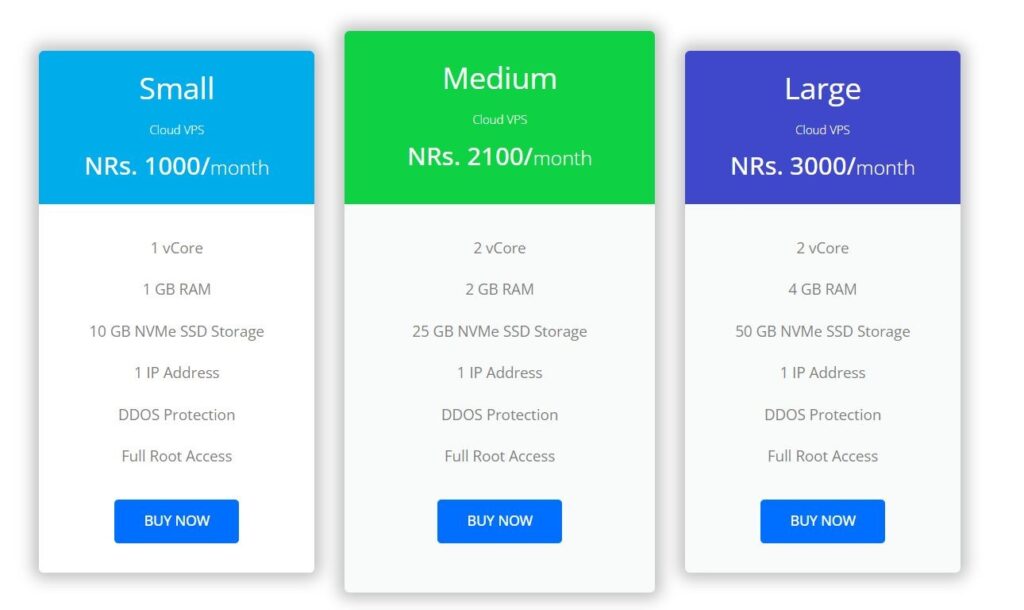Are you finding it difficult to choose between Shared hosting and VPS hosting services in Nepal for your website?
This decision can feel challenging, especially if you are unsure which option will suit your needs best. However, you are not alone in facing this choice.
Many website owners consider the advantages and disadvantages of each hosting type.
Shared hosting is an affordable and beginner friendly option, while VPS hosting provides more control and resources. But which one is right for you?
In this blog post, we will explain shared and VPS hosting in detail, comparing their features, benefits, and limitations.
By the end, you will have a clear understanding of both options and be better prepared to make the right choice for your website.
Let us begin!
Table of contents
What is Shared Hosting?
Shared hosting is a type of web hosting where many websites are hosted on the same server, sharing resources such as CPU, bandwidth, and RAM.
This allows web hosting companies to manage multiple websites on a single server, reducing costs and making it easier for users to access affordable hosting solutions.
Shared hosting is one of the most budget-friendly options available in Nepal, especially for beginners.
Pros of Shared Hosting
Shared hosting is ideal for individuals starting an online business, personal website, or small blog. However, like any hosting type, it has both advantages and disadvantages.
Here are some key pros and cons of shared hosting you should be aware of:
1. Affordable:
Shared hosting is a budget-friendly option, making it the most cost-effective choice for individuals and small businesses with limited budgets.
2. Ease of Use:
Shared hosting typically comes with an easy-to-use control panel, such as cPanel, and one-click software installers like Softaculous.
This makes it simple for beginners to install WordPress or other applications and manage their websites.
3. Beginner-Friendly:
Managing a shared hosting account requires minimal technical knowledge.
It’s a great choice for those launching their first blog or website without prior experience in web hosting.
4. Support and Maintenance:
The hosting provider takes care of server maintenance, upgrades, and troubleshooting, allowing you to focus on running your website without worrying about the technical side of server management.
Cons of Shared Hosting
1. Limited Resources:
Since resources like bandwidth, CPU, and RAM are shared, there are limitations that might not be sufficient for websites experiencing high traffic.
2. Performance Concerns:
Your website’s performance may be affected by sudden traffic surges or excessive resource usage by other websites hosted on the same server.
3. Security Risks:
Sharing a server with multiple websites can pose security risks. If one website has a vulnerability or faces a security breach, it could potentially affect all the other websites on the same server.
4. Not Suitable for High-Traffic Websites:
Due to resource limitations, shared hosting may not be the best option for websites with heavy traffic, as it could lead to slow load times or even server downtime.
Shared hosting is a great entry-level option, but as your website grows, you may need to upgrade to a hosting plan with more resources and better performance.
What is VPS Hosting?
VPS hosting is a more flexible option compared to shared hosting. With VPS hosting, each user gets their own virtual server environment, also known as a virtual machine.
With physical server resources shared, each website is hosted in a unique virtual space that can be customized to fit the user’s needs.
In VPS hosting, you get your own operating system, shared server resources, and root access. This means you can install any software and configure the server to your liking.
Pros of VPS Hosting
1. More Control:
VPS hosting gives you more control over your server. You have root access, which allows you to install your own software, manage programs, and create user accounts.
This gives you a lot of flexibility in how your server operates.
2. Cost-Effective:
While dedicated hosting can be expensive, VPS hosting offers similar benefits at a lower price, making it an affordable option for individuals and small businesses.
It’s a great balance between cost and the control you get, making it a popular choice.
3. Better Performance:
VPS hosting uses high-end server hardware, which ensures faster and more efficient resource distribution.
The resources are dedicated to your website, meaning you can use them as needed without sharing them with others, which leads to better performance.
Cons of VPS Hosting
1. Requires Technical Knowledge:
To fully benefit from VPS hosting, some technical knowledge is needed.
Managing a virtual server can be complex, and if you lack experience, you might need to hire someone to help, which could increase costs.
2. More Maintenance:
Unlike shared hosting, where the provider handles maintenance, with VPS hosting, you’re responsible for keeping your server running smoothly.
If problems occur, you’ll need to troubleshoot and fix them yourself.
10 Difference Between Shared vs. VPS Hosting
| Factor | Shared Hosting | VPS Hosting |
|---|---|---|
| Resource Allocation | Resources (CPU, RAM) are shared among all users on the server. | Dedicated resources for each virtual server user. |
| Performance | Slower performance due to resource sharing. | Faster load times with minimal resource contention. |
| Security | Basic security measures; vulnerable to neighboring sites. | Enhanced security features and isolation from other users. |
| Scalability | Limited scalability; difficult to upgrade without downtime. | Easily scalable; resources can be upgraded as needed. |
| Control | Limited control over server settings and configurations. | Greater control with root access and customizable environments. |
| Management | Typically managed by the hosting provider, it is easier for beginners. | May require more technical expertise; options for managed VPS available. |
| Cost | More affordable, ideal for startups or small sites. | Higher costs but provides better value for growing sites. |
| Uptime | Often lower uptime; affected by other sites on the server. | Higher uptime guarantees due to dedicated resources. |
| Support | Basic support; may be slower during peak times. | Better support options; often prioritized for VPS users. |
| Customization | Limited to pre-installed applications and settings. | Full customization capabilities, including software installations. |
The main difference between VPS and shared hosting is how much control you have over your server.
With shared hosting, your website shares a server with many other sites.
This means you have very little control over the server settings, and everything is set up for you without much chance for customization.
On the other hand, VPS hosting gives you more freedom. You get root access to the server’s operating system, allowing you to customize it to fit your needs.
Let’s look at some more important differences between VPS and shared hosting. Why Choose VPS Hosting Over Shared Hosting.
1. Resource Allocation:
If your website starts gaining traffic, shared hosting can slow down as it shares resources.
VPS hosting offers dedicated resources that can handle growth effectively.
With VPS hosting, each website gets its own dedicated portion of the server’s resources, meaning better performance and stability.

DataHub Nepal offers an entry-level VPS plan with the following features:
- 1 vCore (virtual CPU)
- 1 GB RAM
- 10 GB NVMe SSD storage
- 1 IP address
- DDOS protection
- Full root access
DataHub Nepal VPS Plans and Prices: You can choose to pay for VPS hosting monthly, quarterly, or yearly, depending on what works best for you.
This flexibility makes it easier to find a plan that fits your needs and budget.
2. Performance:
With VPS, your site won’t be affected by other websites. This means better loading speeds and improved user experience.
3. Security:
VPS hosting is generally more secure. You have your own environment, making it less likely for your site to be compromised by a neighboring site.
4. Scalability:
As your business grows, VPS hosting allows for easy upgrades to accommodate increased traffic without needing to migrate to a different server.
5. Control:
VPS provides root access, allowing you to customize settings and install software that fits your specific needs.
6. Management Flexibility:
While shared hosting is beginner-friendly, VPS can offer managed services that allow you to focus on your business while the host manages the server.
7. Cost-Effectiveness in the Long Run:
While VPS is pricier initially, it saves you money in potential downtimes, performance issues, and the need to upgrade frequently.
8. Higher Uptime:
With better resource allocation, VPS hosting typically offers higher uptime guarantees, which is critical for maintaining a professional online presence.
9. Improved Support:
VPS customers often receive prioritized support, which can be a lifesaver during technical difficulties.
10. Customization:
VPS hosting allows for a tailored environment, fitting your specific business needs rather than being confined to the limitations of shared hosting.
Why you Choose VPS Hosting from DataHub Nepal
Choosing VPS hosting at DataHub Nepal covers all benefits towards the growing demands of business enterprises and individuals needing reliable, scalable, secure hosting solutions.
Why DataHub Nepal stands out to be an excellent choice for VPS hosting:
1. Root Access:
With a VPS, you get full root access. This means you control everything on your server. You can install any software you want and restart the server anytime.
2. Scalability:
Websites grow over time as traffic increases. With a VPS, you can easily add more resources like RAM or NVMe SSD storage when you need them. You only pay for what you use.
3. Better Security:
On shared hosting, other websites on the same server can impact your security. But with a VPS, you have your own isolated server environment with control over security settings.
4. Affordable Cost:
VPS plans are very affordable, with prices starting as low as NPR 1000 per month. You only pay for the resources you need.
5. Choose Your OS:
You can choose the operating system for your VPS-Windows or any Linux distribution you prefer.
6. 24/7 Support:
DataHub Nepal offers expert support around the clock to help with any issues or questions you have about your VPS.
Conclusion
If you’ve read this far, you now understand the differences between Shared and VPS hosting and should be able to choose the best option for your needs.
For most people, Shared hosting is the right choice, especially if you’re starting a personal blog and have limited resources or a small marketing budget.
However, if you run a medium to large business, VPS hosting is often a better option because it focuses on performance rather than just affordability and simplicity.
VPS hosting gives you more flexibility, customization, and control. It also provides deeper insights into your website’s hosting infrastructure.
If you’re unsure which web host to trust, I recommend trying out DataHub Nepal’s VPS Hosting.
FAQ’s
Shared hosting is a web hosting service where many websites share the same server. It’s affordable and best for beginners or small websites.
VPS (Virtual Private Server) hosting gives you your own virtual server with dedicated resources, offering more control, better performance, and security.
Shared hosting is better for beginners because it’s cheaper and easier to manage. VPS hosting is more advanced and offers more customization, but it requires some technical knowledge.
Yes, you can upgrade to VPS hosting as your website grows. VPS hosting allows for easier scaling to handle increased traffic and resources.
In VPS hosting, each website has its own isolated environment, reducing the risk of security issues caused by other websites on the server.


